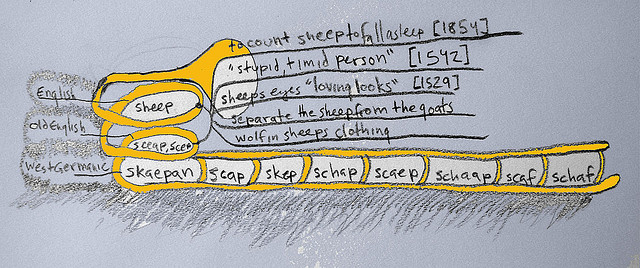
Have you ever thought about languages, and how they develop over time?
Why do we say ‘tree’ when we look at a one of those green things outside our window, and where did the word ‘rose’ come from? (Can you tell that I am looking out of my window for inspiration?)
When we look at the links between the words that we use in English and those in a different country, we often find similarities. Information is the same in English, as in German and French, although the pronunciation is different.
The study of words is called etymology, and today Millie is going to explain a bit more about this, and tell us a bit about the word ‘JUMP’.
What is etymology? Put simply, it is the study of the origin of words and the ways in which their meanings have changed and developed over the course of the centuries.
An etymologist, therefore, is someone who looks at individual words or sometimes phrases and expressions, and tries to trace where they have come from.
This could be from looking at old manuscripts, old writings and books, to find early versions of the word, or it could involve looking at other languages to find what we call “cognates”. These are other words that come from the same root. Sometimes they mean the same thing, and sometimes their meanings might be slightly different.
A good example of this is the English word “mutton”, and the French word “mouton”. These are cognates, as they both come from the Old French word “moton”, which meant “sheep”.
Jump, an active word, that has etymologists on their toes! Meaning that its origin is not completely agreed upon.
Some would have it that jump comes from dialects of southern France, to be picked up by English occupiers during the Hundred Years War.
While I do think this is an interesting theory, I also feel it fails to explain the presence of similar vocabulary in other languages, whose speakers were not part of that war, such as Old Dutch gumpen, Low German jumpen, Danish gumpe, Swedish gumpa and guppa and Icelandic goppa.
All of these suggest to me that a Germanic root is far more likely than the proposed Gallo-Romance one. Not only that, but Chaucer also used it in the form jombren, and although Chaucer lived during the Hundred Years War, the form he used does not resemble typical French forms from that period.
I favour the theory that has jump coming to us from Proto-Germanic gemben, itself from the older source of Proto-Indo-European root gwemb- – to spring, hop, jump




One comment
Leave a reply →